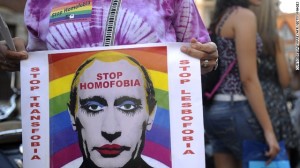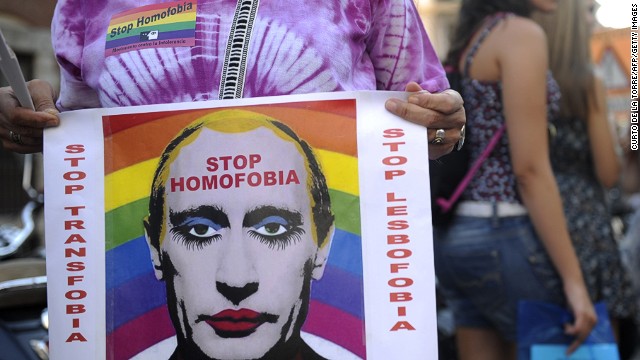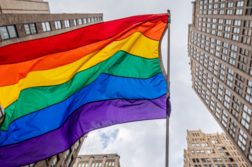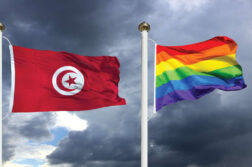 The international outrage over the new Russian law prohibiting “propaganda on non-traditional sexual relationships”—and the call for a boycott on Russian products—has spilled over into some cultural institutions in the U.S. and elsewhere.”
The international outrage over the new Russian law prohibiting “propaganda on non-traditional sexual relationships”—and the call for a boycott on Russian products—has spilled over into some cultural institutions in the U.S. and elsewhere.”
In New York, the Metropolitan Opera’s gala opening on September 23 was a Russian-themed affair, and there were demands from various quarters that the performance be dedicated to the GLBT community, including Russians who now find themselves suffering under the new law (among other anti-gay policies). This demand landed squarely on the desk of Peter Gelb, the general manager of the Met. Gelb emphatically refused, insisting that “throughout its distinguished 129-year history, the Met has never dedicated a single performance to a political or social cause, no matter how important or just.”
Appearing onstage for the performance of Tchaikovsky’s Eugene Onegin were two of Russian President Vladimir Putin’s most prominent allies in the artistic world, soprano Anna Netrebko and conductor Valery Gergiev. But as The New York Times reported: “the first solo voice that rang out in the house was not of a tenor or soprano, but of a protester criticizing the recent antigay laws signed by President Vladimir V. Putin.” Protesters outside displayed a fifty-foot long rainbow banner that said “Support Russian Gays.” The flustered Mr. Gelb even felt the need to wear rainbow-colored suspenders under his tuxedo jacket.
A matter of much larger importance on the world stage is that the Winter Olympics are to be held in Sochi Russia this February. Here the person in the hot seat is Thomas Bach, the new chairman of the International Olympic Committee. Bach, a former German Olympian fencer, had been campaigning for the top job nearly since he won his gold medal in Montreal in 1976. At the IOC meeting on September 10th, in Buenos Aires, he was hit with questions about the anti-gay law. His response was interrupted when Russian Sports Minister Vitaly Mutko announced that President Putin was on the phone to offer his congratulations. Although he took the call, Bach was quick to say that they hadn’t discussed the law.
Later pressed on the anti-gay law by the BBC, Bach stressed that the IOC “is not a supranational parliament of government.” However, he conceded that the IOC is working on a “strategy” to deal with this distraction, to be announced later. No doubt his attention has been diverted from worries about the amount of snow at the Olympics site and the proximity of Sochi to terrorist hotbeds in the Caucasus.
A handful of athletes have spoken out against Russian homophobia, but the IOC has sternly warned potential competitors against political activity. Swedish high jumper Emma Green Tregado was sharply rebuked for wearing rainbow-colored fingernail polish at a track and field event in Moscow. She quickly switched to red. The dilemma the athletes face is those who don’t take a stand on Russia’s anti-gay policies could appear complicit in a spectacle designed to glorify a host country with an abysmal record on human rights.
Since any display of the rainbow emblem apparently violates Russian law, consider the plight of customs officials charged with rummaging through the luggage of tens of thousands of spectators and reporters arriving for the games. Or that of Russian security personnel who must enforce President Putin’s sweeping bans on demonstrations of any kind in the vicinity of Sochi during the Olympics. Wielding the brute force for which Russian security is famous is one thing, but doing it under the gaze of foreign TV cameras is quite another.
Even the president of the U.S. had to find time on late-night TV to tell Jay Leno how he had lost patience with countries that oppress their gay citizens. While attending a summit in St. Petersburg in early September, Obama opted to limit his face time with President Putin in light of current differences, but he did find time to meet with some representatives of Russia’s GLBT activist community.
Putin’s regime brought the international attention on itself when it decided to pass a medieval law that violates every Western concept of free speech. So out of sync is the Russian law with international sentiment on human rights that many non-gay leaders are in a position to condemn the law—and they’re facing pressure from the international GLBT community to do so. Whether the situation in Russia detracts from the world’s enjoyment of luge racing and curling remains to be seen.
Don Gorton, a Boston attorney, is the director of the Anti-Violence Project of Massachusetts.






